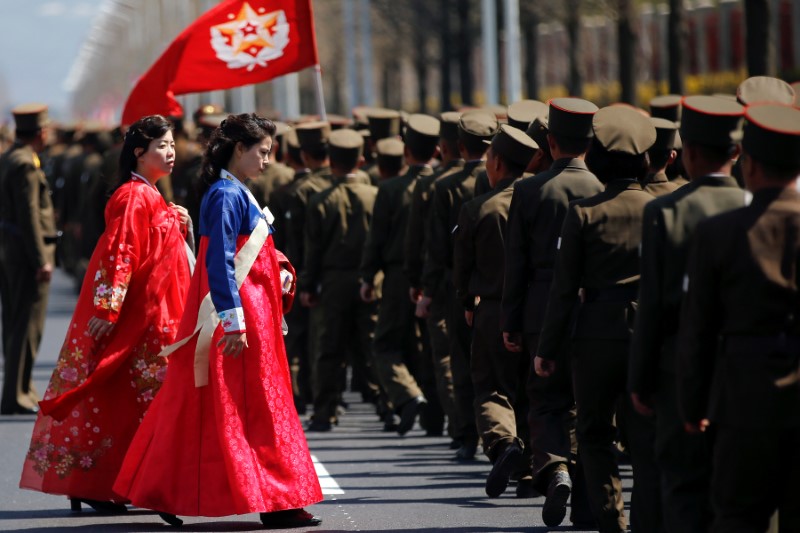
By Joseph Ax and Lisa Fernandez
NEW YORK/SAN FRANCISCO (Reuters) – Women protested around the world on Wednesday for equal rights and in the United States against President Donald Trump, with many Americans skipping work or boycotting stores to demand economic fairness on International Women’s Day.
American women seized upon the momentum of the Women’s March on Washington on Jan. 21, the day after Trump’s inauguration, once again denouncing his policies on abortion and healthcare.
Dubbed “A Day Without a Woman” in the United States, the nationwide events were modeled in part after pro-immigrant demonstrations on Feb. 16, the latest in a series of anti-Trump protests since his Nov. 8 election.
By having women, who make up 47 percent of the U.S. civilian labor force, flex their economic muscle, organizers hope to call attention to the gender pay gap, access to reproductive health services, and Trump’s actions that have restricted abortion overseas.
Debra Sands, 37, a middle school teacher, joined thousands of women at New York City’s Central Park after her students convinced her to attend.
“This past year’s election made me realize that voting in November isn’t enough,” Sands said.
New York police reported 13 arrests at the protest in midtown Manhattan. Details on the possible charges were not immediately available.
In San Francisco, where about 1,500 people gathered, Christine Bussenius, 37, said she and her female colleagues at Grey Advertising convinced their all-male managers to give them the day off and participate in the rally.
“We were nervous,” she admitted. “But the men stepped up to fill in the void.”
Rallies were held in numerous U.S. cities, including Washington, where demonstrators gathered at the U.S. Labor Department.
Female staffers at Fusion Media Group’s Gizmodo declared they were striking for the day.
At least three U.S. school districts, in Virginia, Maryland and North Carolina, closed because of staff shortages after teachers requested the day off.
Nearly 1,000 women converged outside Los Angeles City Hall, many of them critical of the Republican-backed healthcare bill that would strip women’s health and abortion provider Planned Parenthood of funding.
“It’s terrifying. It’s anti-woman,” said Kassia Krozsur, 53, a finance professional.
About 200 gathered in Atlanta, where signs read “We are sisters” and “Stop Trump.”
“If we want to change what is going on, we need to turn anger into action. People need to run for local office,” organizer Rebekah Joy said.

An activist attends a demonstration outside the White House as part of “A Day Without a Woman” strike on International Women’s Day in Washington, U.S., March 8, 2017. REUTERS/Kevin Lamarque
RALLIES AROUND THE WORLD
Events large and small were held in cities around the world.
Across the Texas border, women in Ciudad Juarez, Mexico, painted crosses on lamp posts in solemn remembrance of the hundreds of women who have gone missing or were murdered there in recent years.
In Tbilisi, Georgia, women performed “Glass Ceiling,” simulating being trapped by the barely visible barrier that stands between women and workplace equality.
They banged drums in Kiev, Ukraine, and played soccer in Nairobi, Kenya. In Sanaa, capital of war-torn Yemen, women dressed in niqabs, the all-black garments that cover the entire body except for an opening over their eyes, held up a sign reading, “You keep silent while our children die!”
Not all American women, however, were on board with the call for a women’s strike, with some critics citing the vagueness of the movement’s aims and the disruption of work stoppages.
Trump, whose 11-year-old comments about grabbing and kissing women against their will surfaced during the campaign, took to his Twitter account early on Wednesday to cite International Women’s Day and the “critical role” of women around the world.
“I have tremendous respect for women and the many roles they serve that are vital to the fabric of our society and our economy,” the Republican president tweeted.
(Reporting by Joseph Ax and Gina Cherelus in New York, Letitia Stein in St. Petersburg, Florida, Ben Gruber in Los Angeles, Rich McKay in Atlanta, and Lisa Fernandez in San Francisco; Writing by Peter Szekely; Editing by Daniel Trotta and Diane Craft)











